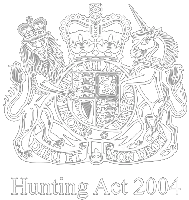Link to the Judgement: Hunting High Court Ruling
The Divisional Court passed judgment on whether ‘searching’ would be included in the definition of hunting and on where the burden of proof lay on the 4th of February 2009. Importantly Mr Justice Maddison and Sir Anthony May concluded that the law was enforceable.
The Court made a ruling on two points of law and found that:
1. Searching for an unspecified wild mammal is not part of the hunting offence.
2. That the burden of proof in relation to the exemptions is split between the defence on an evidential level and prosecution on a legal level.
The implications of this are:
1. By virtue of this judgment, searching on its own is not an offence, but when taken with a quarry animal being found and a chase taking place or the animal being caught, the totality of the activity on the day including the searching may be taken to be illegal hunting if it was intentional. The Divisional Court said it had not attempted to define when searching becomes hunting and says the question of whether a person hunts a wild mammal with a dog is heavily fact-specific; in other words, the facts of each case will have to be considered on their own merits. It is worthy of note that no-one has ever sought to persuade the police or the CPS to investigate or prosecute a case solely on the basis of a search for a wild mammal. In all cases there has been a pursuit and, to that extent, very little in practice has changed as a result of the Court’s decision.
2. The second point before the Court related to the burden of proof if a defendant sought to rely upon an exemption. The Divisional Court has imposed an evidential burden on the defence. This means that the defendant will have to raise an issue (more than speculation) to show his hunting is exempt whereupon the burden is then on the prosecution to prove that it is not. The prosecution does not have to prove each of the conditions in the exemptions, only failure to conform with one condition, which was a point conceded by counsel representing Wright, Scott, Heard and Summersgill. If any one of those conditions are not satisfied the exemption cannot be claimed, so the hunting will be illegal.
Importantly for the police, it is explicit in the judgment that an accused needs to be asked, in interview, for details of the reliance upon an exemption. The Divisional Court sets out the dangers for defendants of not providing those details at an early stage in proceedings: adverse inferences, applications for adjournment, punitive costs orders and the last evidence heard in court being rebuttal evidence.

